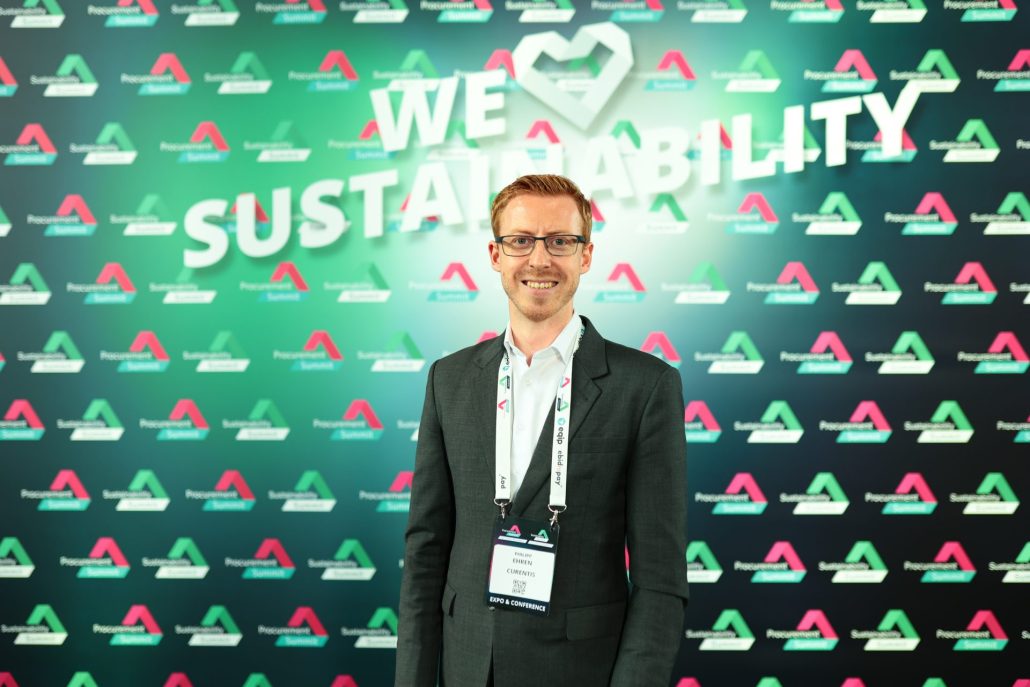CURENTIS at the Sustainability Summit 2025 in Hamburg: impulses, innovations and new perspectives
This year's Sustainability Summit took place in Hamburg on June 25 and 26, 2025 - and CURENTIS was right in the middle of it. Our sustainable banking expert Philipp Ehren took the opportunity to exchange ideas with numerous experts, listen to exciting presentations and gain new impetus for sustainable corporate practice.
An industry meeting place with vision
Together with the parallel Procurement Summit, the Sustainability Summit offered a platform for sustainability, innovation and digitalization. Two main stages, three masterclass stages and a large number of exhibitor stands - including many software providers from small start-ups to SAP - ensured a varied program and numerous opportunities for networking. What was particularly striking was that while many technology and industrial companies were represented, financial institutions tended to remain in the background.
Current challenges and constructive discussions
A key topic was the so-called "Omnibus Initiative", i.e. the planned changes to the European Sustainability Standards (ESRS). Many companies were unsettled by the regulatory uncertainties. Nevertheless, most participants continued to recognize sustainability as an indispensable part of corporate development.
The panel discussions and presentations made it clear that sustainability is not an end in itself, nor is it a short-term trend. Rather, sustainability must be firmly anchored in the corporate strategy. Some participants emphasized that sustainability is not so much a competitive advantage today, but rather a basic requirement for participation in the market. There was widespread agreement that sustainable reporting is not the goal, but the result of serious sustainability efforts - the focus is on analysis, measurement and real transformation.
However, it should be noted that the majority of companies represented at the summit were already actively involved in sustainability.
Success factors and new approaches
A key conclusion of many presentations: The successful integration of ESG issues begins with clear support from top management. It continues with the consistent anchoring of sustainability goals in the corporate strategy, their translation into concrete objectives and KPIs as well as the definition of clear governance structures and responsibilities. Sustainability is profitable in the long term - even if investments are necessary at the beginning.
A presentation by Cubemos also brought three uncomfortable truths to the point:
- Impact comes before reporting - first real change, then reporting.
- Greenwashing remains a challenge, particularly due to non-transparent key figures and ratings.
- ESG is not a stand-alone strategy, but must be integrated into corporate management.
Digitalization and AI as trailblazers
Another key topic was the interplay between sustainability and artificial intelligence. AI can help to recognize correlations, simulate scenarios and improve management decisions. Nevertheless, human classification remains essential - AI is a tool that supports humans, but does not replace them.
During the discussions, it became clear that sustainable digitalization requires more than just technological innovation. Clear proof of origin, traceable data flows and the responsible use of digital tools are crucial. Digital sovereignty, i.e. the ability to use digital technologies in a self-determined and transparent manner, was highlighted as a fundamental prerequisite for sustainable digitalization.
Conclusion
The Sustainability Summit 2025 was a valuable opportunity for CURENTIS to experience current trends and challenges in sustainable corporate management at first hand. The event has shown: Sustainability remains a key topic - characterized by innovation, dialogue and a shared desire to achieve real impact. CURENTIS will use the impetus gained to further sharpen and actively shape its own sustainability strategy.
 About the author: Philipp Ehren has been a Senior Consultant at CURENTIS AG since 2021. He is our specialist for sustainable finance and has several years of experience in project work in risk management with a focus on IT applications. He is also a trained project manager.
About the author: Philipp Ehren has been a Senior Consultant at CURENTIS AG since 2021. He is our specialist for sustainable finance and has several years of experience in project work in risk management with a focus on IT applications. He is also a trained project manager.



